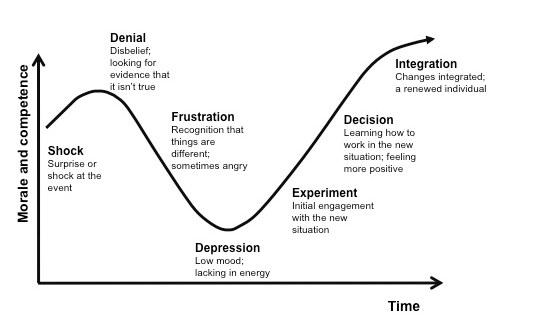Change management has become a standard part of the corporate world. Companies have robust change management tools and techniques in place, they engage experts who drive, support and guide organization through time of change. But do we pay attention, do we spend enough time managing our own personal changes in live effectively?
Current world has too many people suffering from depression and anxiety, people who own so much but are still unhappy, people in despair taking their lives because they cannot cope with loss of loved ones, job or status, because their life is not the same anymore and they cannot foresee the way forward.
To overcome change in our lives, whether small or significant, requires our will, practice, perhaps a little bit of discipline and mainly respect of our own personality and our life. Here are few tips that work well in both companies and our personal lives, rituals embraced by people around me:
-
Always remember Change curve:
Every person, with no exception, goes through his/ her change curve when facing some changes. Length and intensity of the curve or its phases can vary but remember we all experience it.

-
Grant yourself time to heal:
Grant yourself time to live through emotions that appeared, whether it is sadness, anger, sorrow… Allow your emotions to re-surface – cry if you have to, be sad if you feel like, spend some time in solitude if you need to or go to a party. Whatever works for you, allow yourself to live through it, but be respectful and considerate towards people around you. Observe your emotions but don’t sink into them and into self-pity; ensure that you dedicate to it only with time that is necessary.
-
Understand what’s in it for you:
Silence your ego that is surely very hurt and listen to your inner voice. Explanation and answer lies usually right there. Be open minded and think bigger, beyond your own little world. Accept it as a learning not a failure and try to understand how this situation/moment prepared you for the next move; how you changed due to this experience, what lies ahead.
-
Express gratitude:
No matter how hard it can be, stop for a moment and express gratitude. Say it aloud if you can, it is more powerful and far more healing. Be grateful for a situation you had to face, for changes in your career, a person who entered your life or loved one whom you have just lost. Thank them since they prepared you for something else that is coming into your life.
-
A closing ritual and letting go:
Create a ritual that will help you to close it. Sing a song, visualize how a person or situation leaves your life, write, dance, go up to the mountain and let a good bye note or good bye thought fly high and away. Choose your ritual, do it and then let it go with peace, love and gratitude on your mind.
-
Move on and focus on yourself:
Once you do it all, set up a plan – activities you want to focus on and start working on them. If you still cannot envision a long-term plan start with small steps. Remember, every step counts. Focus on yourself – your life, your feelings, envision yourself in the future. Do not slip into comparing with the past “what if” or “how it could have been”. Set small milestones and every time you reach it, celebrate it. It is important to reward yourself and celebrate. This will help you to raise a spirit.
-
Build a positive mindset:
Work consciously on being positive, to practice is important. Positive people are not necessary born positive, they practice to see a cap half full. Include positive moments in your life on daily basis. Define what makes you happy, what lifts your spirit and include it in your daily routine. Program yourself into positivity even if you don’t feel like – your mind will get used to it and eventually will require it. Remember that with positive attitude our body and mind functions much better, we spread positive vibrations and resonate with environment and people who are on the same positive level.


